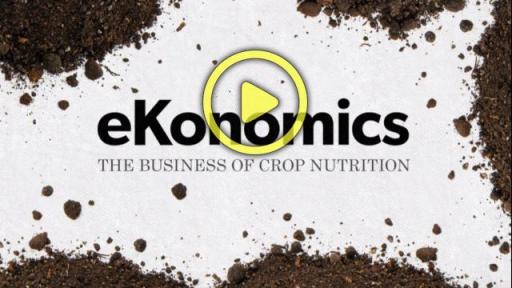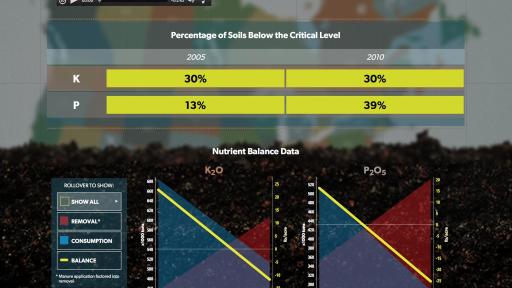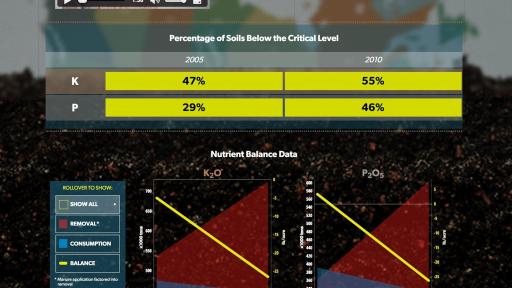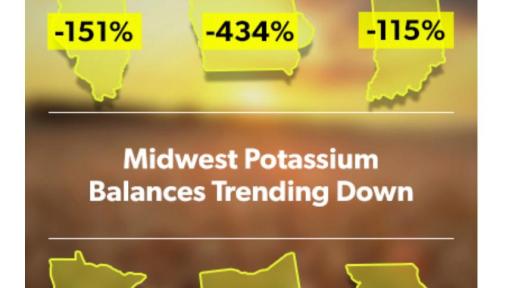NEW ANALYSIS REVEALS SIGNIFICANT DECLINE IN SOIL NUTRIENT LEVELS NATIONWIDE
First-of-its-kind Analysis by PotashCorp’s eKonomics Program Helps Farmers Prepare for Future Fertilizer Needs
Saskatoon, Saskatchewan – July 14, 2015 – PRNewswire
eKonomics from PotashCorp, an online resource dedicated to providing farmers with relevant, easy-to-understand agricultural information, today unveils the first nationwide nutrient balance analysis highlighting a major nutrient application deficit across the United States. The analysis finds that soil nutrient removal rates continue to outpace fertilizer application in most states.
According to the research, while nutrient removal trends have significantly increased, fertilizer consumption levels have decreased, validating the International Plant Nutrition Institute’s (IPNI) study indicating more soils are falling below the critical level for phosphorus and potassium.
This first-of-its-kind analysis aggregated existing nutrient removal records, fertilizer consumption information and manure data from the USDA and The Association of American Plant Food Control Officials (AAPFCO) to better understand regional soil conditions and what farmers should prepare for in the future. The past several years have seen impressive crop yields, providing farmers with increased revenue and an encouraging outlook for years to come. However, high yields come at a price that can easily be overlooked – increased nutrient removal.
“Over the last decade, more and more soils across the United States have been testing below the critical level for phosphorus and potassium,” says Robert Mullen, PotashCorp’s Director of Agronomy. “It’s easy to be lulled into a false sense of security because yields have been so good. However, farmers must prioritize fertilizer to ensure future yields and ultimately their bottom lines are not impacted by decreased nutrient levels.”
First-of-its-kind analysis by @eKonomics_PCS helps farmers prepare for future fertilizer needs. Learn more http://goo.gl/GkQLZh Tweet
To give farmers a clear view on what the conditions are in their area, the research is presented in an interactive map allowing users to engage with the data on a state-by-state basis.
In Iowa for example, the nation’s leading producer of corn and soybeans, potassium balance has decreased a staggering 434% since 1975. This occurred as potassium removal trends increased 35% and fertilizer sales decreased 7%. In addition, IPNI reported the percentage of soils below the critical level, a key measurement in evaluating soil productivity, increased from 47% in 2005 to 55% in 2010.
“eKonomics is committed to providing farmers with the tools and resources necessary to increase their yields, maximize their return on investment and ultimately feed a growing population,” says Dr. Mullen. “This research is a clear indicator of the past, present and future health of our nation’s soil, which is key in ensuring successful crop production in the years to come.”
To view the in-depth state-by-state analysis, please visit the eKonomics site at www.potashcorp-ekonomics.com/geo-data-analysis and join the discussion on Twitter @eKonomics_PCS.
To note: Soil testing is statewide and can differ within regions of every state and province. Nutrient management should occur on a site-specific basis where management objectives and the needs of individual fields and, in many cases, areas within fields, are recognized. Therefore, a general soil test summary like this one cannot reflect the specific needs of individual farms. Its value lies in calling attention to broad nutrient needs, trends, and challenges, and in motivating educational and action programs that are in turn relevant to growers and their advisers.
As the world’s largest crop nutrient company, PotashCorp plays an integral role in global food production. The company produces the three essential nutrients required to help farmers grow healthier, more abundant crops. With global population rising and diets improving in developing countries, crop nutrients such as potash, phosphates and nitrogen offer a responsible and practical solution to help produce the food we need, from the land we have.
For further information please contact:
Thomas Pasztor
Senior Director, Stakeholder Communications, PotashCorp
Phone: (847) 849-4297
Email: [email protected]
Whitney Hinson
gyro, on behalf of PotashCorp
Phone: (312) 416-5664
Email: [email protected]





